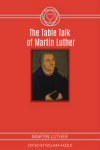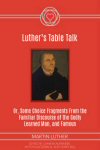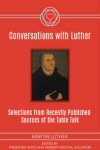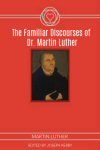Selections from Luther’s Table Talk (4 vols.)
Digital Logos Edition
Overview
Get to know the man behind the Protestant Reformation with Selections from Luther’s Table Talk. Interested in more than Luther’s serious theological views, sixteenth-century Lutheran Reformer Johannes Mathesius compiled a collection of Martin Luther’s sayings into a volume titled Table Talk. Mathesius’ aim was to give readers the experience of dining and conversing with Martin Luther—quips, facetious remarks, and theological gems combined.
This collection, Selections from Luther’s Table Talk, contains special selections from Mathesius’ original volume, featuring Luther’s catechism, discourses, and intimate conversations—recorded by those who knew him well. Offering an intimate glimpse into the man behind the theology, this collection of his sayings are selected and arranged to make Luther more accessible to the masses.
Explore more of Luther’s writings with The Letters of Martin Luther (5 vols.).

Key Features
- Consists of notes of Luther’s discourses
- Arranges Luther’s sayings to make him more accessible
- Contains fragments of personal conversations with Luther
Product Details
- Title: Selections from Luther’s Table Talk
- Author: Martin Luther
- Volumes: 4
- Pages: 1,597
- Christian Group: Lutheran
- Resource Type: Monographs
- Topic: Biblical Studies
Individual Titles
- The Table Talk of Martin Luther
- Luther’s Table Talk: Or, Some Choice Fragments from the Familiar Discourse of the Godly Learned Man, and Famous Champion of God’s Truth
- Conversations with Luther: Selections from Recently Published Sources of the Table Talk
- The Familiar Discourses of Dr. Martin Luther
This title is included in the following collections
You can save when you purchase this product as part of a collection.
Logos 9 Lutheran Bronze Legacy...
$89.99$89.99The Martin Luther Collection (...
$299.99$224.99Logos 8 Lutheran Silver Legacy...
$349.99$349.99Logos 7 Lutheran Silver Legacy...
$349.99$349.99
- $349.99
- $849.99
- $849.99
- $849.99
- $1,499.99
- $1,499.99
- $1,499.99
- $2,999.99
- $2,999.99
- $2,999.99
- $2,999.99
- $4,749.99
- $4,749.99
- $4,749.99
- $4,749.99
- $21,749.99
- $23,999.99
- $24,999.99

The contents of this book were gathered by Luther’s friends and disciples, chiefly by Antony Lauterbach and John Aurifaber (Goldschmidt), who spent much time with the great Reformer towards the end of his life. They consist of notes of his discourses, his opinions, and his cursory observations. They record words spoken in the freedom of private friendship, during his walks, during the performance of his clerical duties, and at the table. This volume also includes Luther’s Catechism.

Luther’s Table Talk: Or, Some Choice Fragments from the Familiar Discourse of the Godly Learned Man, and Famous Champion of God’s Truth
- Author: Martin Luther
- Editors: Johann Aurifaber, Anton Lauterbach, and Henry Bell
- Publisher: Longman, Rees, Orme, Brown, and Green
- Publication Date: 1832
- Pages: 357
This book contains fragments of Martin Luther’s conversations taken from a vast collection of his sayings. The editors selected only those passages from Table Talk that they felt accurately reflected Luther’s character and style. These quotes are arranged by topic, including the Church and preaching, Christian duties, politics, Bible study, and anecdotes about the Reformation.

Conversations with Luther: Selections from Recently Published Sources of the Table Talk
- Author: Martin Luther
- Editors: Preserved Smith and Herbert P. Gallinger
- Translators: Preserved Smith and Herbert P. Gallinger
- Publisher: The Pilgrim Press
- Publication Date: 1915
- Pages: 314
This book of selections from Luther’s Table Talk was edited by Preserved Smith and Herbert Gallinger and is arranged both chronologically and topically. The goal of this translation was to bring new and important material to the attention of the English-speaking public and to supply information that was missing from previous publications.

This book is a collection of the Protestant Reformer’s informal, often colorful, and sometimes controversial conversations about topics ranging from Scripture to the sacraments, from the lives of the saints to the learning of scholastics, from civil magistrates to sacred music—and almost everything in between. It affords valuable and frequently eye-opening insights into Martin Luther’s life.
Nearly all the copies of the original work were destroyed by order of Pope Gregory XIII (1572–1585), and possession of it was punishable by death. But a single copy, wrapped in linen and coated in beeswax, had been secretly buried and was accidentally unearthed nearly 70 years after its banning. It was smuggled to England by Captain Henry Bell, who was responsible for its translation and first English publication in 1652. This collection brings together Luther’s most familiar discourses, arranged topically. They are concise and straightforward, frequently marked by humorous anecdotes, sharp wit, and unrestrained zeal for the work of reformation.
About Martin Luther
Martin Luther (1483–1546) was a key figure in the Protestant Reformation and one of the most significant figures in Western history. Over the course of his life, he was a monk, a priest, a professor of biblical literature, a Reformer, a husband, and a father.
Luther is most noted for his 95 Theses (1517), in which he argues that indulgences are not acts of penance which can replace true repentance. In 1520, Pope Leo X and Holy Roman Emperor Charles V demanded that Luther retract all of his writings. Luther refused. He was subsequently excommunicated and declared an outlaw.
Luther has been both praised and vilified for what he preached and wrote. His translation of the Christian Bible into the vernacular greatly influenced the church. His works continue to impact all Christians and animate the movement that bears his name. His works are also represented in Martin Luther’s Basic Theological Writings and the Luther’s Works collection.